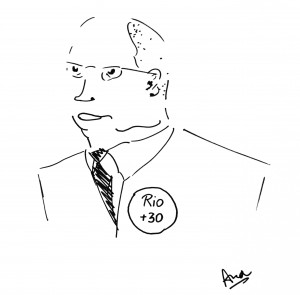by Anna Odell
One of the issues when dealing with “sustainable development” is the lack of clarity around the term itself. We have spent an entire term working, studying, and understanding text such as the “The Future We Really Want” in depth and grasping the general issues that are relevant for Rio+20. But at times, I feel as though we need to take a step back and look at what we expect developing nations to become and what developed nations need transition to. What are they developing towards? To paraphrase Mr. Kartikeya Sarabhai, from the Center for Environmental Education in India, when examining development, we have to define what sort of development we are looking at. What do we actually want our future “green societies” to look like, and how will we get there?
The current model of development is illogical; developing nations are attempting to develop into the model that the developed nations have created, while at the same time the developed nations are attempting to transition to sustainability. However, the planet does not have the capacity for the world’s population to develop into over-consuming nations, such as the United States. As we use the current “developed” world as a model, we are running into some serious issues. While listening to the negotiations, sometimes I feel that states need a gentle reminder that sustainable development is not simply “development.” Instead of moving into the model already set by the developed world, developing nations have the unique opportunity to skip the wasteful carbon intensive development process which is socially, environmentally, and economically inequitable and inefficient, and shift to being sustainably developed. It is necessary for us to re-envision how we want our world to look, and how we are going to get there.
That’s where Education for Sustainable Development (ESD) comes into the picture. Mr. Sarabhai stated, “The real change is when people change,” and education is one of the most effective ways of implementing that crucial and necessary change. For generations we have had an education system that has attempted to teach us to obey societal norms and categorize, and now we need an education system that teaches us to think critically (and in fact, human ecologically) in order to solve the most serious problems ever facing the human species. According to Mr. Sarabhai, “not only do you need a different paradigm of development, you need a different paradigm of education.”
Another common issue with the current education and development paradigm is the assumption that the rich, developed world has it all figured out. It is also important to note that clearly the presence of an advanced education system itself does not imply “sustainable development.” Despite 80% of United States citizens having a post-secondary degree, the comparatively small population of the United States consumes about 30% of the world’s resources. ESD must include policy makers, youth, disadvantaged communities, and developing and developed nations. Ms. Laila Iskander, of the Community and Institutional Development Consulting in Egypt, shared a powerful example of the system of trash and recycling collection system that was organized by the poorest people in Cairo’s slums. People would go door to door collecting trash, then sorting it and recycling and reusing it into products to be sold for profit. This system grew to employ over 120,000 workers, and with the help from an NGO, education programs were started and those who never received a formal education were able to start their own businesses and flourish. Then, the North discovered something magical: Landfills. Landfills were then imposed on Egypt, creating a system in which trash was taken far away from the city (and the workers who were actively collecting and supporting themselves) and multinational corporations took control over what previously was an entirely local, economic system. The transportation of the trash is actually much more carbon intensive and inefficient. Ms. Iskander stated, “we need to stop talking about how we must education the poor people in the South; It is the people in the North who need to learn first.”




